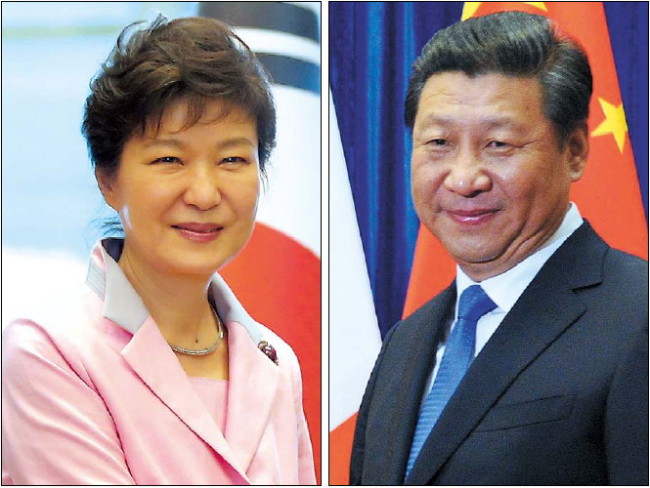The leaders of South Korea and China are expected to underscore their opposition to North Korea’s pursuit of nuclear weapons and their push to expedite bilateral free trade negotiations during a summit in Seoul later this week, government sources said Monday.
After the summit on Thursday, Presidents Park Geun-hye and Xi Jinping are to issue a joint statement, which observers presume will include their resolve to denuclearize the Korean Peninsula, but may fall short of singling out the North for denuclearization.
Xi is to arrive in Seoul on Thursday for a two-day state visit. He will be accompanied by a large economic delegation consisting of some 200 Chinese business and financial leaders.
 |
(left) President Park Geun-hye (Yonhap)(right) Chinese President Xi Jinping (Yonhap) |
High on the agenda for the summit is likely to be North Korea’s nuclear weapons program.
During their summit last June, the leaders recognized that the development of nuclear weapons poses grave threats to peace and stability on the peninsula and beyond, without making any specific mention of North Korea.
In line with last year’s statement, Park and Xi are expected to reaffirm their opposition to Pyongyang’s possession of nuclear arms, analysts said.
Xi is likely to stress the need to resume the multilateral aid-for-denuclearization talks. Although Park has insisted that Pyongyang first show sincerity in its commitment to denuclearization, she could show more flexibility and lean toward dialogue, in a move to improve inter-Korean ties, observers said.
Last month, the foreign ministers of the two countries agreed on the need to resume meaningful dialogue to yield “substantive” progress on the North’s denuclearization and prevent the North from further sophisticating its nuclear technology. The ministers met to coordinate the agenda and schedule of the summit.
During Thursday’s summit, the two leaders are also likely to discuss the progress of free trade negotiations. Through 11 rounds of negotiations, the two countries have reached consensus on broad terms, agreeing to remove import tariffs on 90 percent of all products.
Observers said that the leaders could mention that the two countries are toward the tail end of their FTA negotiations.
The leaders could also discuss simmering historical feuds with Japan amid the rising international criticism of Tokyo’s move to undermine the credibility of its landmark 1993 apology for its mobilization of Asian women to frontline brothels during World War II.
But the issues involving Japan may not be on the “official agenda,” analysts said, given that Seoul appears reluctant to seriously damage its ties with Tokyo at a time when the U.S. wants its two core Asian allies to get along well to strengthen joint security cooperation to counter North Korean threats.
In the broader context of international politics, China experts noted that Xi’s visit to Seoul comes at an important juncture, with the rising Asian power seeking to expand its regional influence based on its economic and military clout.
China has recently called for a new Asian security structure excluding the U.S., revealed a new “Silk Road” vision to expand its cultural and economic reach in the region and beyond, and sought to establish the Asian Infrastructure Investment Bank, a scheme analysts say is intended to establish a China-led regional financial order.
“Amid all these moves, the summit between South Korea and China will take place. This is the reason why the world is closely watching what kind of agreement will come out of the summit,” said Kim Heung-kyu, diplomacy professor at Ajou University.
By Song Sang-ho (
sshluck@heraldcorp.com)








![[Weekender] Korea's traditional sauce culture gains global recognition](http://res.heraldm.com/phpwas/restmb_idxmake.php?idx=644&simg=/content/image/2024/11/21/20241121050153_0.jpg)